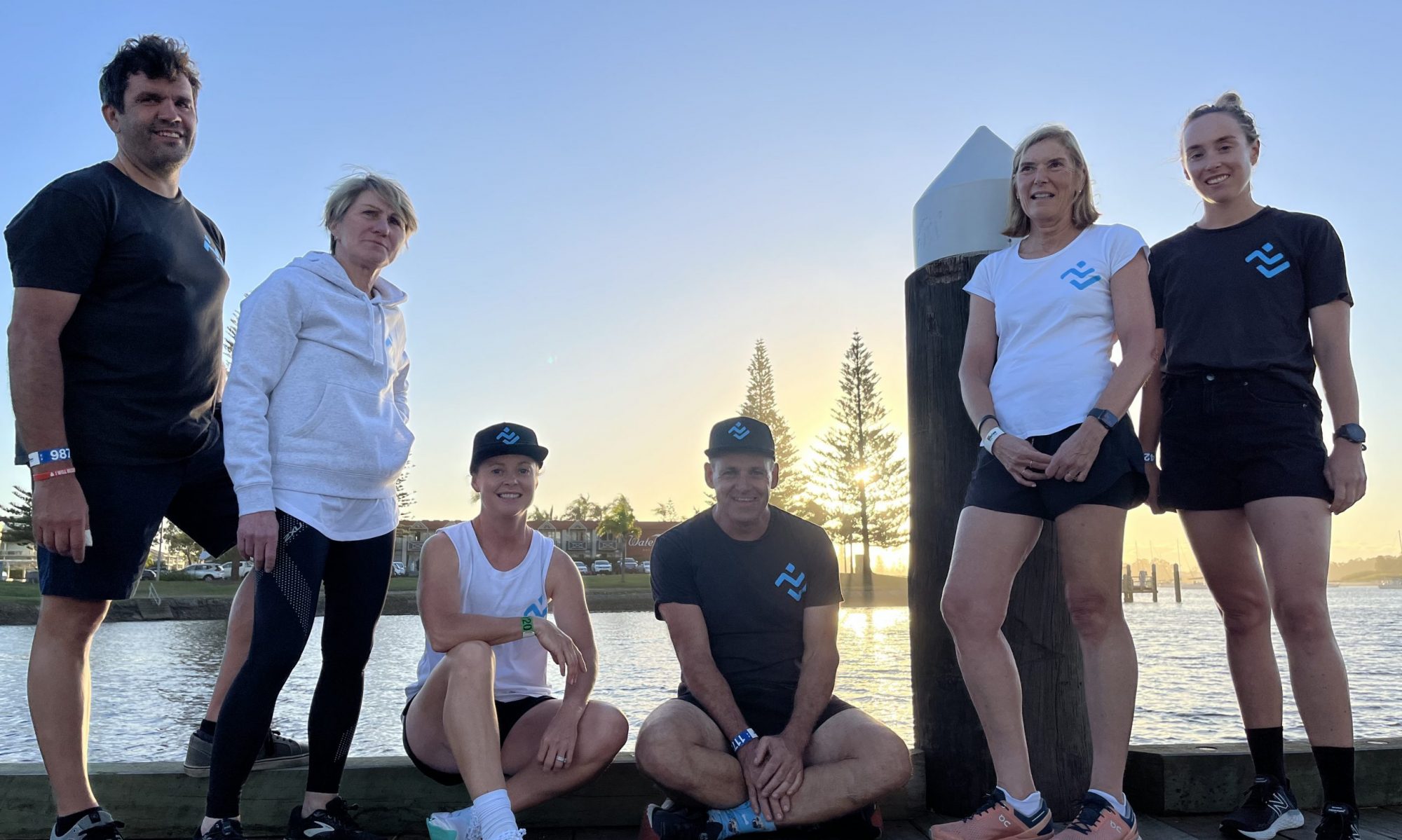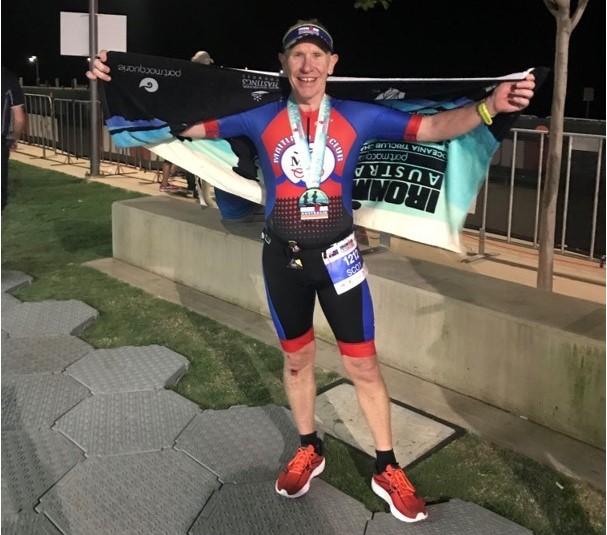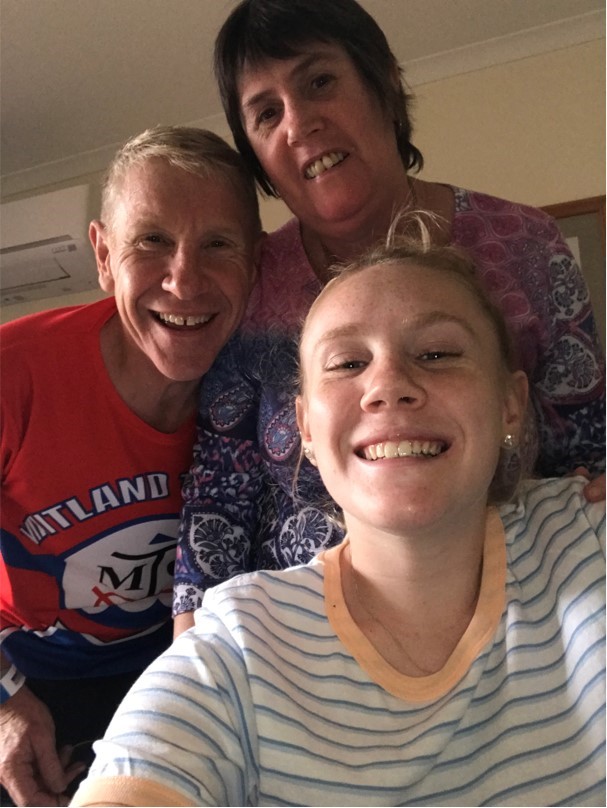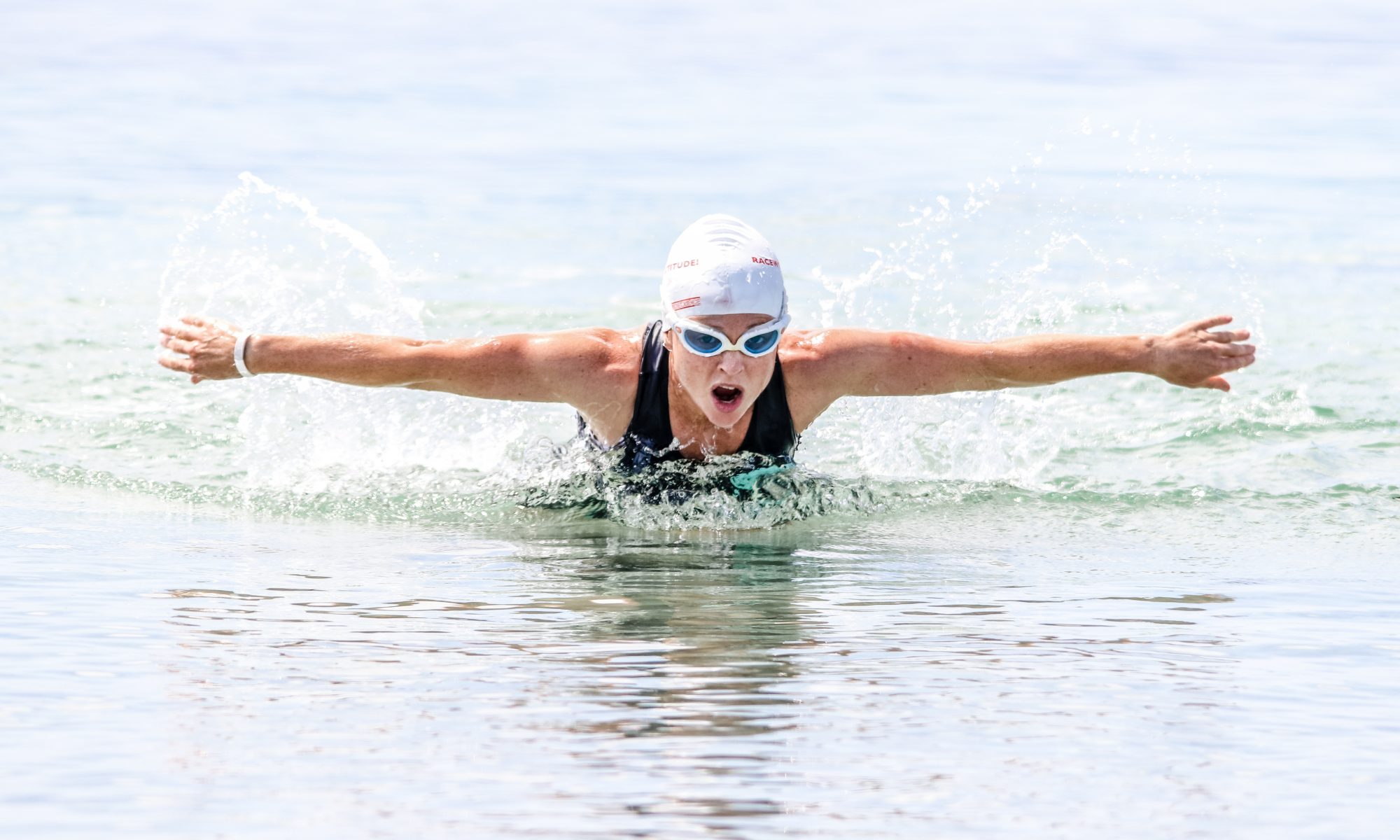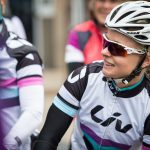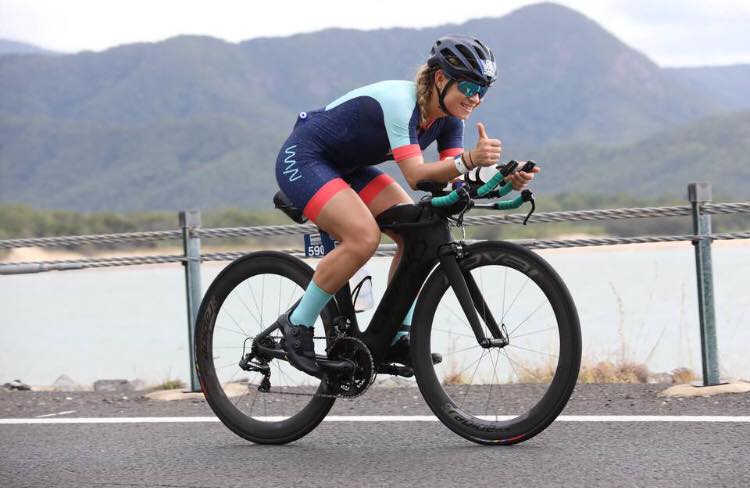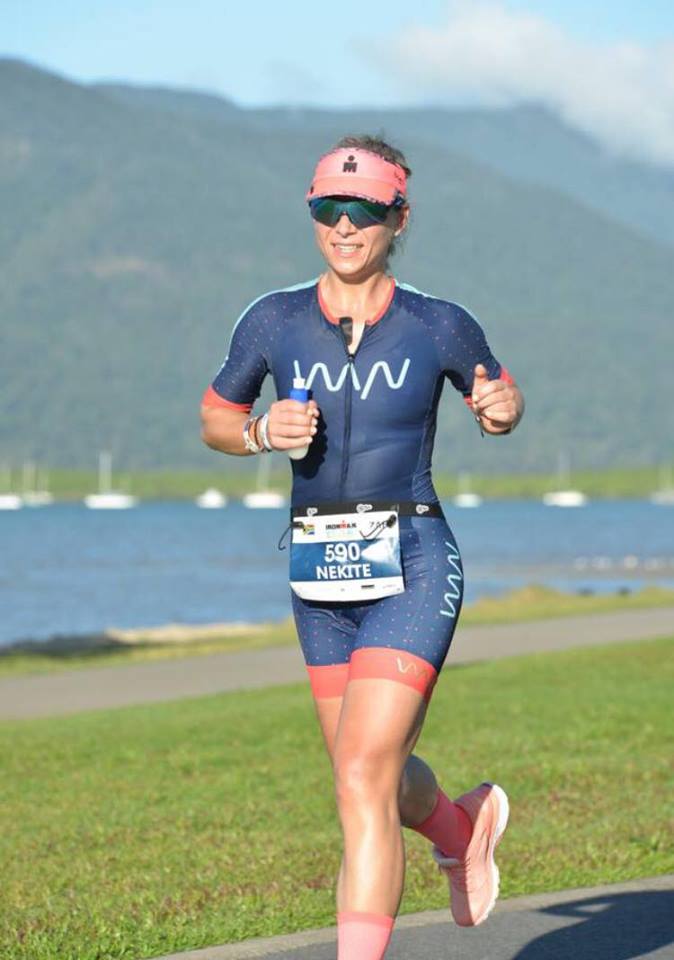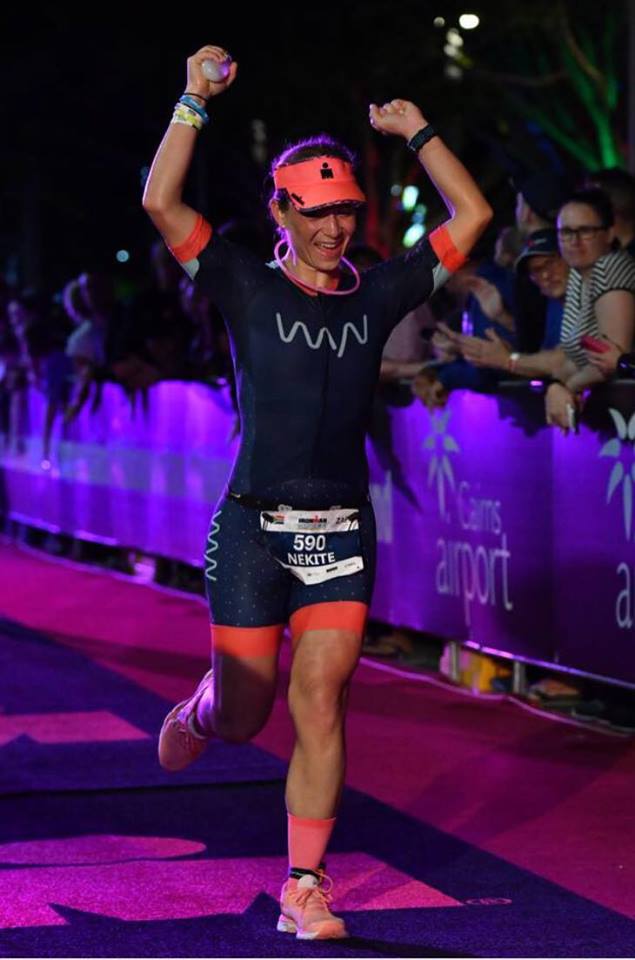CPC: Firstly congratulations, Caroline Houston YOU ARE AN IRONMAN!! How does it feel?
CAROLINE:
Coming down that chute I was so stoked – I forgot to do anything coming over the line, so no special pics there !
I am happy with how I stuck to what I needed to do to prepare, which I don’t think was very sociable sometimes, and gave me some hard decisions, but it really gave me confidence (once I got out there) that I was fully prepared. But I seriously did not believe that until I was on the course, prior to that I was sick with worry (and still not very sociable!)
CPC: It’s a tough game this Ironman business that’s for sure and can bring out deep rooted insecurities and fears. But… for now, let’s take a few steps back, you started your coaching / training with CPC mid 2018 ahead of your preparation for the Standard Distance worlds. You were really looking forward to the experience, but unfortunately race day you had an unfortunate accident and crashed – but even that couldn’t stop you finishing! It did however stop you in your tracks for your attempt at Busselton 2019 with a shoulder injury. Talk us through that.
CAROLINE:
Yes, I was happy to finally be on a supported track as I had wafted around trying to do a ‘self program’ & was getting very dissatisfied with lack of progress/direction.
Worlds: lesson here,
1) this was the only corner I didn’t recon thoroughly prior to racing,
2) plus, I went into it too hard as I was trying to make up ground, braked hard (right hand corner & I am worse that side) & the wheel went from underneath me. I knew I had done damage – I got up & yelled at this guy not to touch me (otherwise I would be disqualified) & he said he was an official, so it was OK but as I could move my arm I figured nothing broken and I should just finish. From here, I then worked out I had no lower gears, only big chain ring and I was a bit concerned with a short sharp hill on 2nd lap, also, being on the drops was a bit painful. Then both running in with the bike and the pull on my shoulder was painful on the run, I was always going to finish (this is the Worlds!) , just maybe not in good shape.
CPC: so post race you actually had to have shoulder surgery, spent approx. 8 weeks off training (incl. 4 weeks in a sling) and 14 weeks out of the pool, but worked diligently on your rehab. How hard was it though coming back to full health after your surgery? How did your coach and physio / medical team help you work through that process?
CAROLINE:
This phase was a very controlled & prescribed section. I was on the bike (WT & Indoor classes) as early as possible (in a sling) as I figured I could monopolise on that period to build up my bike strength. Injuries can be an opportunity!
Honestly, my physio & coach worked hand in hand to both strengthen & control me through this phase (which was quite long). One thing I found was, I needed to communicate avidly to both of those experts in order to get the best outcome. No comment from me – no comment from them , because there were no details – absolutely, categorically, tell them the smallest changes / concerns (eg. something going on in this calf – which turns out to be a stress on the perineal, easily fixed by some rehab) So having a team around ou is super important and helped me get to the start line of my Ironman that’s for you – I could not have done it without them.
CPC: when did it get to that moment in your training when you thought ‘yes I can really do this’! (Ironman) ?
CAROLINE: I am forever mindful that it’s a huge ask of the body, and, there are so many things that can get in the way/go wrong. When I reached the taper period I added up the training & prep and thought I should be able to do this, and the confidence in my preparation grew, so I was OK to put myself out there, but I think it was only when I was out on the course & gauging how I was feeling, that I actually finally allowed myself to truly believe.
CPC: Once you landed in Cairns / Port Douglas and checked out the course, what went through your mind? And how did you manage any self doubt that started to creep in on race week?
CAROLINE: Hah ! Thanks to Geoff for getting me in the water at Palm Cove at least 3 times. The more we went in the water, the more comfortable I felt, but I was mindful that I am not strong in the water and if these were race day conditions, I was not likely to make the cutoff and was not sure how I would manage that heartbreak. But for me, it was about being as prepared as possible to help allieviate those doubts, and that included putting myself in situations and exposing myself to conditions I didn’t feel super comfortable about, because you can get anything come race day.
CPC: Despite that, conditions on race day turned out not too bad, soooo, talk us through your race? We want to know how it unfolded! How were the nerves on race morning? What did you find the toughest? How did you keep focused?
CAROLINE:
I knew I would be almost unable to talk on race morning & we had made the decision to take the buses so I was not having an apoplexy about being late – good move. Checked the bike, heard the usual explosion of a tyre in transition and glad it wasn’t me ! Frantically looked for Sharon starting in the 70.3 and off she went effortlessly into the froth.
Swim: I had been nervous all week and on the morning, luckily for me the water was calmer. So, I figured I had a chance. I was with my friend Michelle (7 time Ironwoman) going into the water, and she was boldly pushing us forward. Once out there, I think I could even see her in the water near me – good news, I was not completely at the back! Reaching the yellow buoy I knew this was about ¼ of the way but couldn’t see Michelle & figured she was way ahead, it didn’t feel as strong a current against us as it had on the leadup days, but I was getting nowhere fast. So much so, I checked my watch at the 2nd pink buoy (hoping it was 50 mins, but it was actually more like 60 ). Trying not to feel deflated I plodded on hoping for a bit of current to bring me in. For a while there I looked around & figured that the circling rubber duckies meant that I was the last one out there, couldn’t see anyone either. I got into a bit of rhythm & thought maybe I would try breathing on the left as on my right it was very sunny plus into the chop. Turns out that was a bad move, I became a bit dizzy doing that, and went back to 1in4 on the right. Bit tricky spotting the last buoys as the swell seemed bigger in the last few hundred metres. BUT all in all, I got through for me – what is the toughest leg.
Bike: running (trotting) out of transition after my complete wardrobe change, I was hanging onto all the food I had in my back pockets – reckon I could have fed a few of us ! (I watched a video of me getting on my bike – it’s hilarious, it’s as if I am in slo-mo!)
I spent a lot of time thinking about Sarah’s advice to always be pedalling – make the most of the downhills, so we could hit that 27kph average. I was a bit nervous going hard down hills and concentrated to stay alert, and thanks to Geoff for painstaking going over every metre of the bike course (in the car) prior, to be as best prepared as possible – pot holes, wind etc. The scenery was amazing, and, when you are ‘up the back’ there’s quite a bit of open road with not too many athletes so plenty of space to view.
I had slightly misjudged the last 30k’s by not having enough personal landmarks to help me ‘clock’ where I was, so the last part of the ride was a bit of a slog, especially as my expectations of times kept slipping past, and, by this time, me & the saddle were not friends. So I was happy to pass the bike onto volunteers and start to tackle the last leg.
Run: What a relief to get here with no mechanicals & in one piece ! I set out with a renewed energy but brought myself straight back to sticking to the plan and not going out too hard – a long way to go yet. I was at first very deflated as the pace is very slow but I knew I had to do it to get there, also, some ‘empty gut’ issues were starting and I didn’t want to suffer from that again so started sucking on Clif Bloks as a way to get at least something in. I spent a lot of time thinking about the course and how many k’s I was at as I couldn’t really see my watch, and, I don’t think I had turned it on properly as it kept beeping at me. Once 1.5 laps in, I was a bit more settled and just stuck to the pace, sucked on a bit of water melon and the Blocks & it was starting to go OK, I just wanted to finish ! With 2k’s to go I decided to go as fast as I was capable of at that point & storm home. Stoked coming down the chute! What a wave of emotions!
CPC: Hearing an athletes race story always gives me goosebumbs! For most athletes doing their first Ironman (well technically your second after the shortened Busso in 2017), I try not to focus too much on the time outcome, but more the experience and having a consistent and well-rounded race. How do you feel you went in this regard?
CAROLINE: I was certainly so much better prepared for this race than Busso, I had really put in the training, to achieve realistic goals. I was thinking about it when I was on the bike, I felt confident that I had the prep behind me for all disciplines.
CPC: and the bonus – you nailed the race and came away with not only a fantastic experience, but a race result that reflected all you hard work – PLUS A PODIUM FINISH! Full results here

CPC: So what would you say is a highlight (or highlights!) is/are from your Ironman experience? What will stay with you forever?
CAROLINE:
My strength at the end – I had energy left for the last 2 kms and I pushed hard to the finish & enjoyed the finishing chute experience ! It really was a little surreal, and awesome, and hard, and incredible all in one!
CPC: any wise words for other mature athletes thinking of taking on the goal of Ironman later in life?
CAROLINE:
Don’t think of the end-game if you have a big goal in mind. Break it down, with your coach, and it is all achievable. Be patient and it is possible 😊
CPC: Wise words!
I always finish with this question…. so – what’s next for Caroline Houston? Would there be another Ironman on the cards one day?…. 😁
CAROLINE:
Oh wow – right now, I feel like all the stars were aligned for me, I did the best I could do on the day, I had all the training under the belt, plus, the weather was good to us, so if I went in search of a better performance time wise I could be in for a tough challenge. Not sure I need to go there again, I need to sit back for a while, I might do shorter racing for the time being – I just don’t want to assume shorter = easier, because it is not!
CPC: anything else you would like to add / people to thank?
CAROLINE:
Gosh, this was a team effort ! A huge thanks to this team 😊
Coach Sarah: honest & upfront, & able to gauge me as an individual to probe questions and help me through with a ‘fitted’ program
Hubby Geoff: for putting up with me hardly being around, being with me in the open water no matter how slow I was
Friend & training partner Sharon: constant encouragement, great friend & being that arse for me to chase (she’s a very good rider)
Friend & S&C Coach Kerryn: constant support, strength training & sounding board to unload to
Steve: physio from Lakeside Sports Medicine Centre, who helped me set my expectations, & used needles & painful massage to keep me on track. 🙂
My employer, Mondelez: for being flexible with my hours
